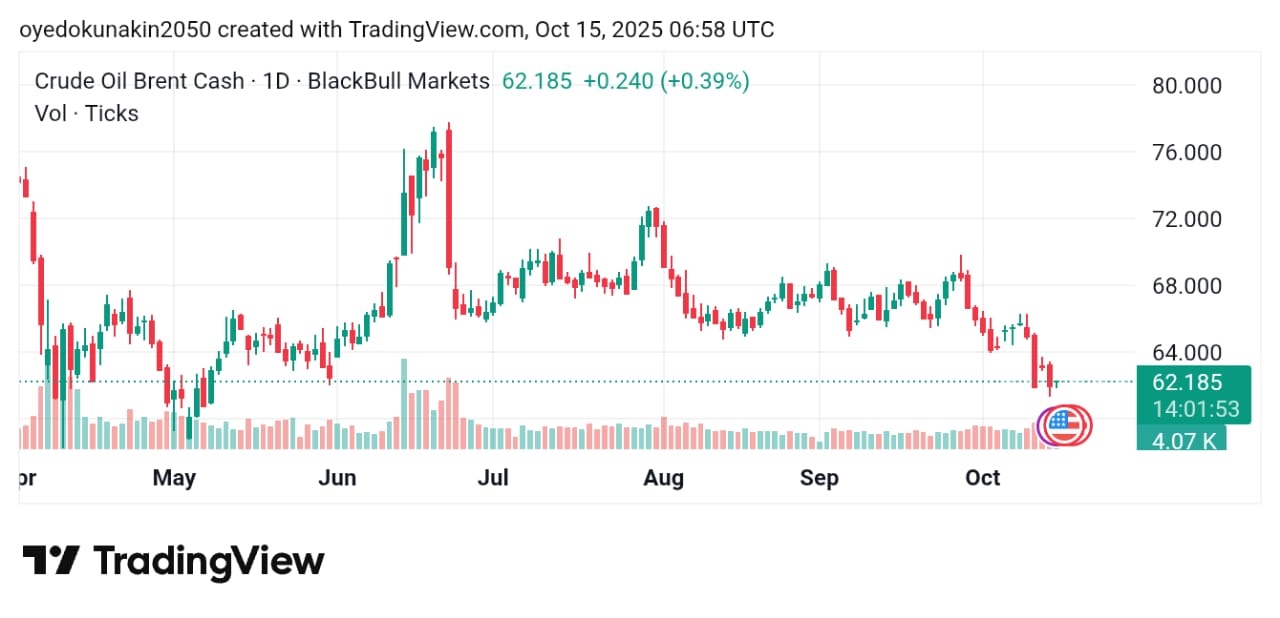
Akintunde Oyedokun
Research Analyst
Oil Prices End Week Lower as Supply Concerns Weigh on Market
Oil prices inched up on Friday but still recorded a weekly drop of nearly 3%, pressured by oversupply warnings from the International Energy Agency. Brent Crude closed at $61.29 per barrel, while West Texas Intermediate settled at $57.54.
An upcoming meeting between Donald Trump and Vladimir Putin, along with a Gaza cease-fire, eased geopolitical risks, but renewed U.S.–China trade tensions and weak economic sentiment kept prices under pressure.
IMF Cautions Against U.S.-China Trade Rift Impact on Growth
Kristalina Georgieva of the International Monetary Fund urged the U.S. and China to ease trade tensions, warning that a rare earth supply disruption could slow global growth.
The IMF lifted its 2025 growth forecast to 3.2% but said rising trade risks were not factored in. Georgieva noted global resilience but highlighted persistent uncertainty. Mohammed Al-Jadaan and Nicola Willis stressed constructive talks and continued commitment to multilateral trade.
New Zealand Inflation Hits 3%, In Line With Forecast
New Zealand’s inflation rose to 3.0% in Q3, matching forecasts and hitting the top of the central bank’s target range. Quarterly CPI grew 1.0%, driven by higher electricity, rent, and local taxes.
Reserve Bank of New Zealand had projected this level and recently cut rates to support the economy. Non-tradeable inflation eased slightly to 3.5%, while the New Zealand dollar stayed stable amid global uncertainties.
High Prices and Poor Quality Stall Ivory Coast Cocoa Trade
Cocoa purchases in Ivory Coast have slowed at the start of the 2025/26 season as record-high farmgate prices of 2,800 CFA francs per kg and poor-quality beans deter buyers and exporters.
Exporters face soaring costs and tight liquidity, with banks unwilling to finance deals. Around 50,000 tons of stored beans are being rejected by grinders due to low quality, leaving traders unable to buy new stock. Some hope price cuts or blending old and new beans will help restart trade.
Dangote Refinery Cuts Crude Intake Over High Prices, Not Faults
Dangote Refinery said recent lower crude inflows were a strategic response to high global prices, not operational failures. Minor maintenance and inventory adjustments caused temporary reductions in crude demand. The refinery also reported 22 failed sabotage attempts, all prevented by its safety systems.
Despite these challenges, the 650,000-barrel-per-day facility continues to operate efficiently. Its performance contrasts with Nigeria’s state-owned refineries, which remain largely inactive due to years of mismanagement and neglect.










